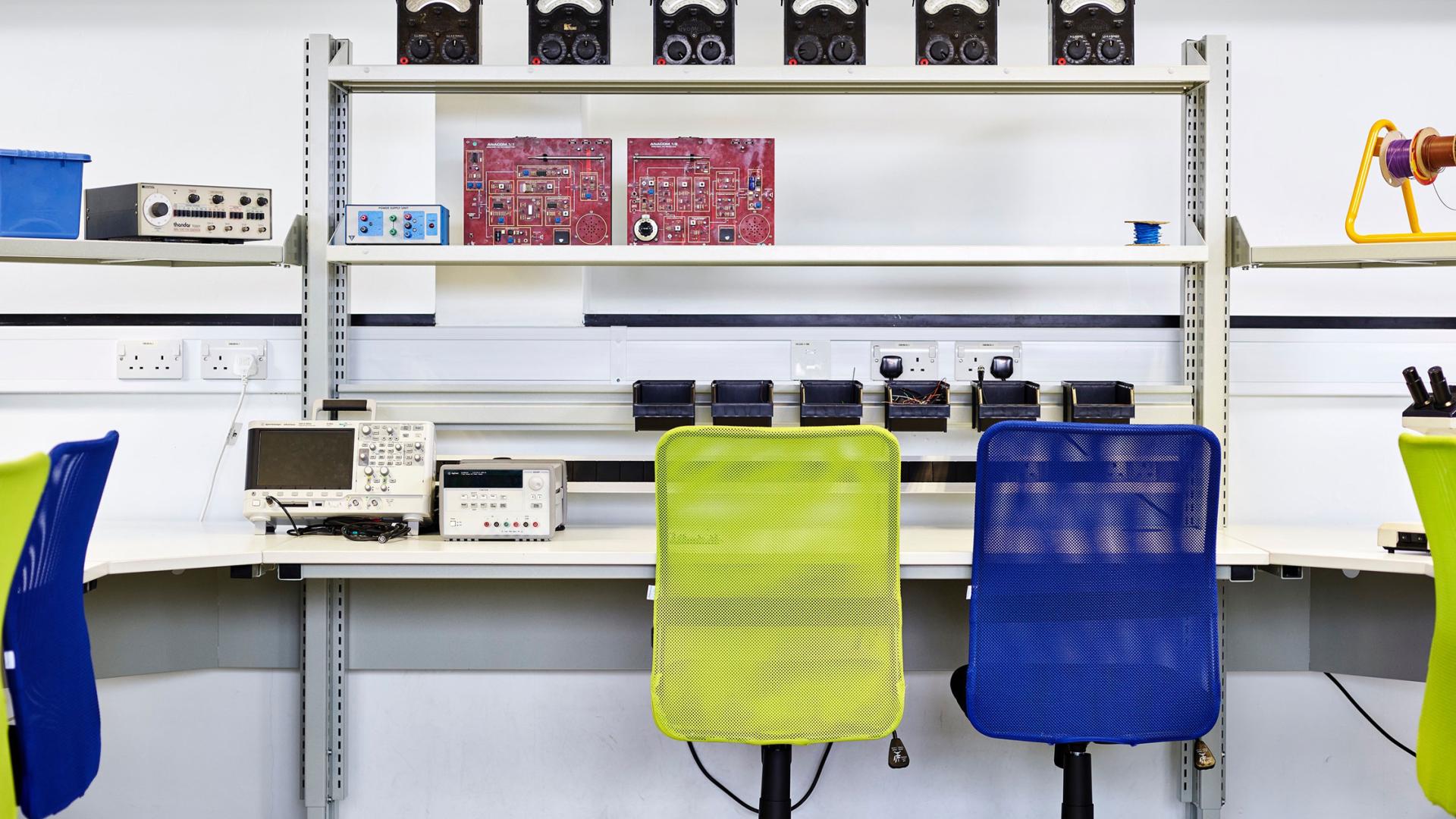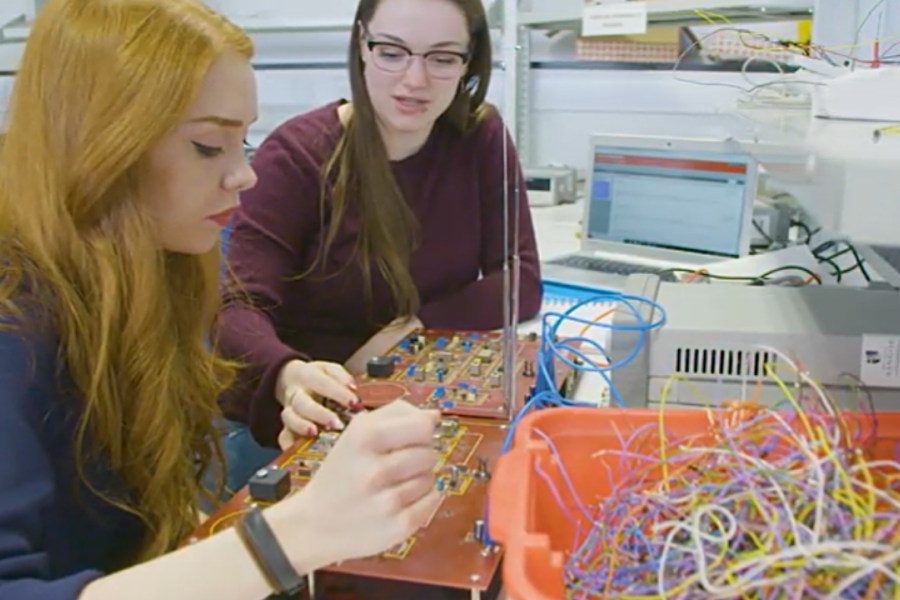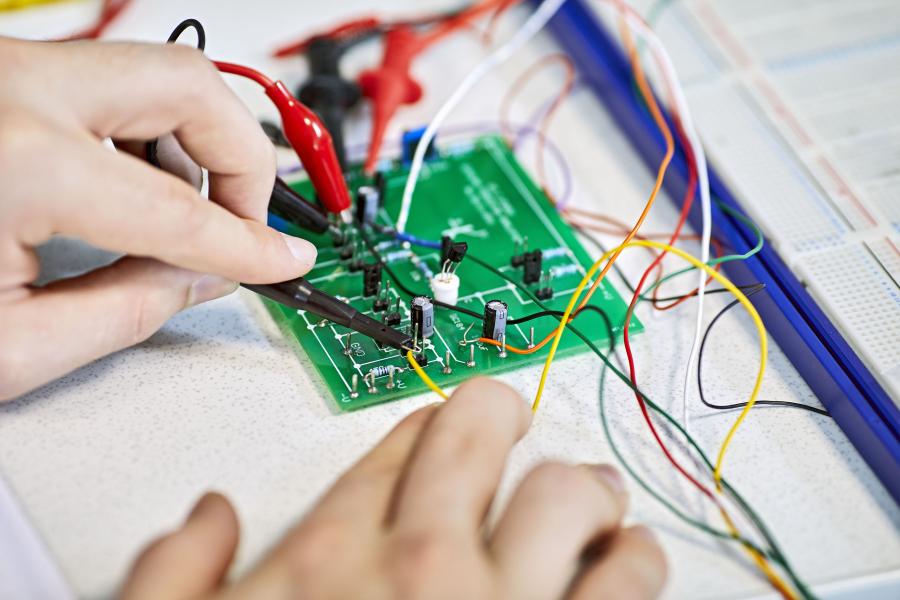About This Course
This course is a three-year honours degree, preparing you for a professional career in electronic systems design.
We’ve designed this course to accommodate anyone without the usual qualifications in mathematics and physics. Meaning you can pursue your interest in electronics and electronic systems to degree level. During the course you will get a thorough grounding in all the latest techniques in analogue and digital electronics, together with training in professional skills, project management techniques and an intensive preparation in maths and science for electronics. You will gain extensive practical experience to ensure that you develop sound practical skills as well as a thorough theoretical knowledge.
Why choose Bangor University for this course?
- There is high demand from international employers for graduates of this course.
- We have a 95% employability rating.
- We have a strong research base in optoelectronics, communications, microelectronics, bioelectronics and materials science, and organic and plastic electronics.
- Electronic Engineering at Bangor is ranked 4th in the UK for Research.
- It is recognised by the European Federation of National Engineering Associations.
Additional Course Options
This course is available with a Placement Year option where you will study for 1 additional year. The Placement Year is undertaken at the end of the second year and students are away for the whole of the academic year.
The Placement Year provides you with a fantastic opportunity to broaden your horizons and develop valuable skills and contacts through working with a self-sourced organisation relevant to your degree subject. The minimum period in placement (at one or more locations) is seven calendar months; more usually you would spend 10-12 months with a placement provider. You would normally start sometime in the period June to September of your second year and finish between June and September the following year. Placements can be UK-based or overseas and you will work with staff to plan and finalise the placement arrangements.
You will be expected to find and arrange a suitable placement to complement your degree and will be fully supported throughout by a dedicated member of staff at your academic School and the University’s Careers and Employability Services.
You will have the opportunity to fully consider this option when you have started your course at Bangor and can make an application for a transfer onto this pathway at the appropriate time. Read more about the work experience opportunities that may be available to you or, if you have any questions, please get in touch.
This course is available with an International Experience Year option where you will study or work abroad for 1 additional year. You will have ‘with International Experience’ added to your degree title on graduating.
Studying abroad is a great opportunity to see a different way of life, learn about new cultures and broaden your horizons. With international experience of this kind, you’ll really improve your career prospects. There are a wide variety of destinations and partner universities to choose from. If you plan to study in a country where English is not spoken natively, there may be language courses available for you at Bangor and in your host university to improve your language skills.
You will have the opportunity to fully consider this option at any time during your degree at Bangor and make your application. If you have any questions in the meantime, please get in touch.
Read more about the International Experience Year programme and see the studying or working abroad options on the Student Exchanges section of our website.
Course Content
You will spend about 12 hours in lectures and 8 in laboratories each week. You will also have tutorials and have to write up experiments, work on software design and complete numerical problem-solving exercises.
You will have an examination for each module at the end of the semester. Some modules have coursework assessment as well. Your laboratory work books, technical reports on some of the experiments and the final-year project also contribute to your marks.
The first year of the programme gives you the opportunity to build a solid foundation in designing, modelling and building analogue and digital circuits, additional support is provided for the mathematics
The second year develops the foundations and applies these new skills to more advanced concepts in electronic circuits, including VLSI & Digital Circuits, Sustainable Project Management and Microelectronics and Nanophononics.
During the third year of the course some optionality has been introduced to allow and individual specialism, complement this with the individual project you will have a unique and personalised experience.
Modules for the current academic year
Module listings are for guide purposes only and are subject to change. Find out what our students are currently studying on the Electronic Engineering BSc (Hons) Modules page.
Course content is for guidance purposes only and may be subject to change.
Facilities
Engineering facilities
- Large fully equipped computing laboratories and all the latest software.
- A recently installed immersive technologies laboratory, where the latest devices are used for project and research work.
- A recently installed large networking laboratory to provide students with the opportunity to design and administer networks and for the teaching of computer architecture modules.
- A large undergraduate teaching laboratory, full of industry standard equipment.
- This is where you will undertake practical sessions put into practice what you have learned in your lectures.
- A class 1000 clean room which all undergraduate students will experience during their studies. This will give you unique training in clean room protocols which is invaluable experience when you are looking for jobs after your degree.
General University Facilities
Library and Archive Services
Our four libraries provide a range of attractive study environments including collaborative work areas, meeting rooms and silent study spaces.
We have an extensive collection of books and journals and many of the journals are available online in full-text format.
We house one of the largest university-based archives not only in Wales, but also the UK. Allied to the Archives is the Special Collections of rare printed books.
Learning Resources
There is a range of learning resources available, supported by experienced staff, to help you in your studies.
The University’s IT Services provides computing, media and reprographics facilities and services including:
- Over 1,150 computers for students, with some PC rooms open 24 hours a day
- Blackboard, a commercial Virtual Learning Environment, that makes learning materials available on-line.
Course Costs
General University Costs
Home (UK) students
- The cost of a full-time undergraduate course is £9,000 per year (2021/22 entry and 2022/23 entry).
- The fee for all placement, international, and sandwich years is £1,350 (2021/22 and 2022/23).
- More information on fees and finance for Home (UK) students.
International (including EU) students
Additional Costs
There are also some common additional costs that are likely to arise for students on all courses, for example:
- If you choose to study abroad or take the International Experience Year as part of your course.
- If you attend your Graduation Ceremony, there will be a cost for gown hire (£25-£75) and cost for additional guest tickets (c.£12 each).
Course-specific additional costs
Depending on the course you are studying, there may be additional course-specific costs that you will be required to meet. These fall into three categories:
- Mandatory Costs: these are related to a particular core or compulsory module that you’ll be required to complete to achieve your qualification e.g. compulsory field trips, uniforms for students on placement, DBS Check.
- Necessarily Incurred Costs: these may not be experienced by all students, and will vary depending on the course e.g. professional body membership, travel to placements, specialist software, personal safety equipment.
- Optional Costs: these depend on your choice of modules or activity and they are shown to give you an indication of the optional costs that may arise to make sure your choice is as informed as possible. These can include graduation events for your course, optional field trips, Welcome Week trips.
Entry Requirements
GCSE: grade B/5 in Maths, higher tier (if Level 3 qualification does not include Maths or Science study).
Offers are tariff based, 88- 104 tariff points from a Level 3 qualification e.g.:
- A-levels: General Studies and Key Skills not normally accepted.
- BTEC National Extended Diploma: MMM - DMM
- Cambridge Technical Extended Diploma: MMM - DMM
- City & Guilds Advanced Technical Extended Diploma (1080): case-by-case
- International Baccalaureate Diploma is accepted
- Welsh Baccalaureate is accepted
- Access: case-by-case
- T-levels: considered on a case-by-case basis.
- Extended Project Qualification: Points can include a relevant Extended Project (EPQ) but must include a minimum 2 full A-levels, or equivalent.
We are happy to accept combinations of the qualifications listed above, as well as alternative Level 3 qualifications such as City & Guilds, Access and Cambridge Technical Diplomas.
We also welcome applications from mature learners.
For full details go to our website and for a full list of accepted Level 3 qualifications, go to www.ucas.com
International Candidates: school leaving qualifications and college diplomas are accepted from countries worldwide (subject to minimum English Language requirements). More information here.
General University Requirements
To study for a degree, you’ll be asked for a minimum of UCAS Tariff points. For a fuller explanation of the UCAS Tariff Points, please see www.ucas.com.
We accept students with a wide range of qualifications and backgrounds and consider each application individually.
All students need to have good basic skills and the University also values IT and communication skills.
As part of the University’s policy, we consider applications from prospective disabled students on the same grounds as all other students.
We also consider applications from mature students who can demonstrate the motivation and commitment to study a university programme. Each year we enrol a significant number of mature students. For more information about studying as a mature student, see our Studying at Bangor section of the website.
EU and International Students' Entry Requirements
For detailed guidance on the entry requirements for EU and International Students, including the minimum English Language entry requirement, please visit the Entry Requirements by Country pages. International applicants can also visit the International Education Centre section of our website for further details.
Bangor University offers International Incorporated Bachelor Degrees for International students whose High School qualification is not equivalent to the UK school leaving qualification. The first year (or Year 0) is studied at Bangor University International College, an embedded College on our University campus and delivered by Oxford International Education Group.
Careers
Graduates of this degree will have enviable career prospects: many will take up electronic or computer systems designer posts, or work for government or private research and development facilities.
Opportunities at Bangor
The University’s Careers and Employability Service provides a wide range of resources to help you achieve your graduate ambitions.
The Bangor Employability Award (BEA)
The BEA is a comprehensive online course that you can work through at your own pace, taking you through all the steps you need to take to explore, prepare and apply for your dream career.
Internships
Bangor University runs a paid internship scheme within the university’s academic and service departments.
Student Volunteering
Volunteering widens your experience and improves your employability. Find out more about volunteering on the Students’ Union’s website.
Foundation Year
A 'with Foundation Year' option is available for this course. Apply for Electronic Engineering (with Foundation Year).
What is a Foundation Year course?
If you don’t have the required qualifications for the degree-level course or are looking to re-enter education after time away from study, then a Foundation Year Programme might be the right choice for you.
The Foundation Year is an excellent introduction to studying this subject at university and will provide you with the knowledge, skills and confidence required to go on to study this course at degree-level.
When you have successfully completed the Foundation Year, you can progress on to the first year of this degree-level course.






